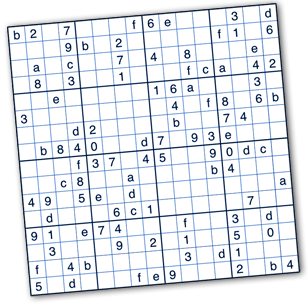Hexadecimal Sudoku Solver

In my ICS211 course, I was tasked to implement a recursive method to find the solution to 16x16 Hexadecimal Sudoku. Professor Moore provided a format of the Sudoku code, and our classmates had to complete the code that was provided. The implemented Hexadecimal Sudoku was a 16x16 grid of integers with values of 0 to F. The valid answer for the Sudoku problem was it must have only one of 0 to F values without any duplicates among each row, each column, and each 4x4 grid. The recursive method to find the valid solution of the sudoku was the following:
- If all cells are filled, see if this Sudoku is valid. If it is valid, we have found a solution. If not, this Sudoku is not a solution. [Base case 1].
- If at least one cell is not filled, see what values are legal for this cell.
The algorithm of this assignment was an example of backtracking. The code tries to search for a valid value from a starting point, and it returns to the starting point if it cannot find any valid value. This recursion method keeps running until all the values have been tried and find a different option.
Here is one example of my implentmention for the project, which to check Sudoku is solved or not:
public static boolean solveSudoku(int[][] sudoku) {
// check sudoku is solved, if it is not solved then loop
if (checkSudoku(sudoku, false)) {
// loop through the sudoku row and column
for (int row = 0; row < sudoku.length; row++) {
for (int column = 0; column < sudoku.length; column++) {
// if sudoku has a empty space then return fillCell method
if (sudoku[row][column] == -1) {
return fillCell(sudoku, row, column);
}
}
}
}
return checkSudoku(sudoku, false);
}
View code: Hexadeciaml-Sudoku